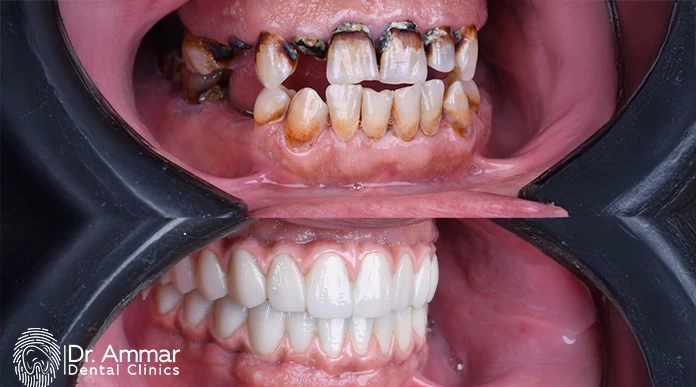Dental Implants
Dental implants are modern, long-lasting solutions for replacing missing teeth. They are titanium posts surgically placed into the jawbone, acting as roots for artificial teeth (crowns, bridges, or dentures). Unlike traditional dentures or bridges, dental implants provide a stable and permanent solution.
Dental implants offer several advantages over other tooth replacement options. Not only do they restore the appearance and function of natural teeth, but they also help maintain jawbone health and prevent the sunken look that often accompanies tooth loss.
The Dental Implant Procedure
The procedure of dental implant includes:
Initial Consultation and Evaluation
The first step towards getting dental implants is an initial consultation with your dentist. During this appointment, the dentist will evaluate your oral health, including taking X-rays to assess the condition of your jawbone. The success of dental implants largely depends on the quality and quantity of bone available to anchor the implants.
The Surgery: Step-by-Step Process
The procedure for dental implants is typically done in stages:
-
Implant Placement: The dentist will surgically insert the titanium post into the jawbone under local anesthesia.
-
Healing Period: The implant will fuse with the bone in a process called osseointegration, which can take several months.
-
Abutment and Crown: After healing, a small connector (abutment) is placed on the implant, and a custom crown is attached, completing the restoration.
Aftercare and Recovery
The recovery process involves following your dentist's instructions carefully, including avoiding hard foods, maintaining oral hygiene, and attending follow-up appointments. With proper care, dental implants can last a lifetime.
Benefits of Dental Implants
The benefits of dental implants include:
-
Restored Functionality and Comfort: Dental implants restore your ability to chew, speak, and smile comfortably.
-
The Look of Natural Teeth: The custom-made crowns attached to implants blend seamlessly with your natural teeth, providing a beautiful and natural appearance.
-
Bone Preservation: One of the biggest advantages of dental implants is their ability to preserve the jawbone. When a tooth is lost, the jawbone begins to shrink, but implants stimulate the bone, preventing further bone loss and maintaining the structure of the face.
Types of Dental Implants
The types of dental implants are:
Endosteal Implants
Endosteal implants are the most common type, inserted directly into the jawbone. They are often used when there is sufficient bone to support the implant. Once the implant is integrated into the bone, a crown is placed on top.
Subperiosteal Implants
Subperiosteal implants are placed under the gum but above the jawbone. These are typically used when there is not enough healthy bone to support an endosteal implant, but they are less common than endosteal implants.
All-on-4 Implants
This technique uses just four implants to support a full arch of teeth, making it an excellent option for those who have lost most or all of their teeth. The implants are strategically placed to maximize support and minimize bone grafting needs.
Are You a Candidate for Dental Implants?
Dental implants are suitable for most adults who have lost teeth. Candidates should have:
-
good oral health.
-
sufficient jawbone density.
-
healthy gums to support the implants.
Those with chronic diseases like diabetes or smokers may need additional assessments before proceeding.
Some patients, particularly those with insufficient bone density or certain health conditions, may not be ideal candidates for dental implants. In these cases, bone grafting or other procedures may be necessary.
What Influences the Cost of dental implant?
The cost of dental implants can vary depending on several factors:
-
Location: Prices may vary based on geographic location and the experience of the dental professional.
-
Type of Implant: The complexity of the implant procedure and the materials used can influence the price.
-
Additional Treatments: Costs may increase if bone grafting or sinus lifts are required.
Possible Complications and Side Effects
While dental implants are generally safe and effective, complications can arise, including:
-
Infection at the implant site
-
Nerve damage
-
Implant failure due to poor osseointegration
Proper aftercare and following your dentist’s instructions can minimize these risks.
Dental Implants vs. Other Tooth Replacement Options
Dental Implants vs. Dentures
While dentures are a more affordable option, they do not offer the same level of stability or comfort as dental implants. Dentures can slip and require adhesives, whereas implants function like natural teeth.
Dental Implants vs. Dental Bridges
Dental bridges are another option for replacing missing teeth, but they require the filing down of neighboring teeth. Implants, on the other hand, do not affect adjacent teeth and offer a longer-lasting solution.
Dental implants are a life-changing solution for anyone who has lost teeth, offering both functional and aesthetic benefits. Whether you’re seeking to restore your smile, regain confidence, or improve your quality of life, dental implants provide a reliable, long-lasting solution.
At Dr. Ammar Dental Clinics, our team of highly skilled specialists combines advanced technology with years of expertise to deliver dental implant treatments that look and feel natural. If you’re considering dental implants, book your consultation today and discover why Dr. Ammar Dental Clinics is one of the top destinations for dental care in Cairo and the Middle East.

